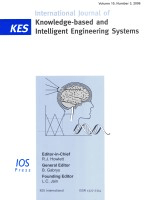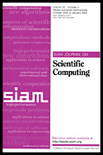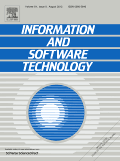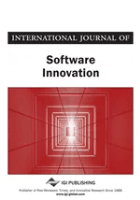
Innovations in Systems and Software Engineering
Scope & Guideline
Elevating Standards in Software Engineering Research
Introduction
Aims and Scopes
- Software Engineering Methodologies:
The journal emphasizes new methodologies in software engineering, including agile approaches, model-driven engineering, and hybrid algorithms that enhance software development processes. - Machine Learning and AI Applications:
There is a strong focus on integrating machine learning and artificial intelligence within software engineering, exploring their applications in areas like defect prediction, performance optimization, and intelligent automation. - Systems Modeling and Verification:
Research on modeling techniques, including formal methods, system dynamics, and Petri nets, is prevalent, contributing to the reliability and safety of software systems. - IoT and Cyber-Physical Systems:
The journal covers innovative solutions and frameworks for Internet of Things (IoT) applications and cyber-physical systems, addressing challenges such as security, scalability, and real-time processing. - Sustainability and Environmental Impact:
Recent publications indicate a growing interest in environmentally sustainable computing and the impact of software engineering practices on ecological systems.
Trending and Emerging
- Deep Learning Applications in Software Engineering:
There is a marked increase in the application of deep learning techniques across various domains within software engineering, including defect prediction, image processing, and system optimization. - Proactive Security Measures:
Recent publications emphasize proactive security measures, particularly in IoT and cyber-physical systems, indicating a growing focus on threat detection, risk management, and resilience in software design. - Context-Aware Computing:
Research on context-aware computing is emerging, particularly in IoT and smart environments, highlighting its potential for enhancing user experiences and system efficiencies. - Sustainable Computing Practices:
The trend towards sustainability is evident, with an increase in studies addressing the environmental impacts of software engineering practices and exploring eco-friendly solutions. - Integration of Blockchain Technology:
Blockchain technology is increasingly featured in recent publications, particularly in relation to secure data management and supply chain applications, showcasing its growing relevance in systems engineering.
Declining or Waning
- Traditional Software Testing Techniques:
There has been a noticeable decrease in papers focusing solely on traditional software testing techniques. The shift towards automated and AI-driven testing methods indicates a transition to more advanced practices. - Basic Data Mining Techniques:
The frequency of publications centered around fundamental data mining techniques has decreased as more sophisticated machine learning methods and hybrid approaches are gaining traction. - Classical Requirements Engineering Approaches:
Research focusing on classical requirements engineering seems to be waning as newer methodologies, including agile and model-driven approaches, become more prominent in the literature. - Static Analysis Tools:
There appears to be a decline in the exploration of static analysis tools for software verification, with a growing emphasis on dynamic and hybrid analysis methods in recent studies.
Similar Journals

International Journal of Knowledge-Based and Intelligent Engineering Systems
Pioneering Insights in Knowledge-Driven EngineeringThe International Journal of Knowledge-Based and Intelligent Engineering Systems, published by IOS PRESS, serves as a vital platform for scholars and practitioners involved in the fields of Artificial Intelligence, Control and Systems Engineering, and Software Development. Founded in 2004 and continuously publishing through to 2024, this journal stands out with its comprehensive coverage of innovative methodologies and applications that leverage knowledge-based systems. Although currently listed in Q4 for Artificial Intelligence and Q3 for Control and Systems Engineering, it features an increasing trajectory in the scientific community, as indicated by its rankings in Scopus—which reflects the growing importance of intelligent engineering systems in contemporary research. With a commitment to disseminating cutting-edge research without open access constraints, this journal is essential for those seeking to understand and contribute to advancements in intelligent systems. Join a global community of researchers and industry leaders by engaging with the latest findings shared in this well-regarded journal.

FORMAL ASPECTS OF COMPUTING
Unveiling New Dimensions in Formal Aspects of ComputingFORMAL ASPECTS OF COMPUTING is a distinguished journal published by the ASSOCIATION FOR COMPUTING MACHINERY, dedicated to the fields of Software Engineering and Theoretical Computer Science. With the ISSN 0934-5043 and E-ISSN 1433-299X, this journal has made a significant impact in its categories, achieving a Q3 ranking in both Software and Theoretical Computer Science as of 2023. The journal spans over three decades since its inception in 1989, providing a platform for high-quality research that addresses critical formal methods and their applications in computing. While it currently does not offer open access, it remains an essential resource for researchers and practitioners in the field. The journal's credibility is bolstered by its Scopus rankings, placing it in the top half of both theoretical and software-related fields. By engaging with current trends and fostering innovative approaches, FORMAL ASPECTS OF COMPUTING stands as a vital repository of knowledge and a catalyst for future advancements in the discipline.

Automated Software Engineering
Advancing the Future of Software EngineeringAutomated Software Engineering is a premier journal dedicated to advancing the field of software engineering through the exploration of innovative methodologies, tools, and applications. Published by Springer since its inception in 1994, this journal has established itself as a vital resource for researchers, industry professionals, and students alike, providing insights into the latest trends and technological advancements. With an impressive impact factor and currently ranked in the Q2 quartile of the Software category, it is recognized for its contribution to the discipline. The journal covers a broad scope of topics including automation in software development, empirical studies, and theoretical advancements, fostering discussions that bridge academia and industry. As we look forward to converging towards the year 2024, the journal continues to invite high-quality submissions that challenge existing paradigms and pave the way for future innovations in software engineering.

International Journal of Machine Learning and Cybernetics
Advancing the Frontiers of AI and CyberneticsInternational Journal of Machine Learning and Cybernetics, published by SPRINGER HEIDELBERG, serves as a pivotal platform for scholars and practitioners in the fields of Artificial Intelligence, Computer Vision, and Software Engineering. With its impressive Q2 and Q1 rankings in esteemed categories such as Artificial Intelligence and Computer Vision and Pattern Recognition, this journal boasts a commendable reputation within the academic community, further solidified by its Scopus rankings that place it in the top percentiles of its category. This journal covers critical advancements and research trends spanning the years from 2010 to 2024, facilitating knowledge exchange that drives innovation in machine learning and cybernetics. Although it operates under a subscription model, it remains accessible for extensive readership, comprising researchers, professionals, and students eager to advance their understanding in this dynamic and rapidly evolving discipline. Stay at the forefront of technology by engaging with the latest findings and methodologies published in this influential journal, identified by its ISSN 1868-8071 and E-ISSN 1868-808X.

EMITTER-International Journal of Engineering Technology
Bridging Theory and Practice in Engineering TechnologyEMITTER-International Journal of Engineering Technology is a distinguished and innovative journal published by POLITEKNIK ELEKTRONIKA NEGERI SURABAYA, focusing on the dynamic field of engineering technology. Since its inception in 2013 as an Open Access journal, it has been dedicated to advancing the dissemination of high-quality research that bridges theoretical knowledge and practical applications. With an ISSN of 2355-391X and an E-ISSN of 2443-1168, EMITTER invites researchers and practitioners to engage with critical topics in electrical engineering, software development, and technology integration. The journal aims to foster a collaborative environment for the sharing of groundbreaking insights that enhance technological development and innovation in engineering practices, making it an essential resource for academics, industry professionals, and students alike in the ever-evolving landscape of technology.

SIAM JOURNAL ON SCIENTIFIC COMPUTING
Pioneering Innovations in Numerical AnalysisSIAM Journal on Scientific Computing is a premier journal published by SIAM Publications, focusing on the interdisciplinary domain of scientific computing. With a significant standing in the academic community, this journal boasts a 2023 Q1 ranking in both Applied Mathematics and Computational Mathematics, positioning it among the top-tier publications in these fields. The journal aims to disseminate high-quality research that applies computational methods to solve scientific and engineering problems, fostering advancements in numerical analysis, algorithms, and software development. Researchers and professionals can greatly benefit from the journal's rigorous peer-review process and its reputation for publishing cutting-edge studies. Though it is not an open-access journal, subscribing institutions and individual subscribers gain access to a wealth of knowledge tailored for those seeking to enhance their expertise in scientific computation. With its established history since 1996 and continuing to publish until 2024, the SIAM Journal on Scientific Computing remains an essential resource for students, researchers, and professionals dedicated to pushing the boundaries of this dynamic field.

EMPIRICAL SOFTWARE ENGINEERING
Exploring empirical evidence to enhance software development methodologies.Empirical Software Engineering is a leading journal published by Springer, dedicated to advancing the science and practice of software engineering through empirical research. With an impressive impact factor in the Q1 quartile of the Software category and a Scopus ranking of #76 out of 407 journals, it occupies a prominent position within the field, attracting high-quality submissions from around the globe. Since its inception in 1996, the journal has provided a vital platform for disseminating critical findings that drive the evolution of software development methodologies and practices. While it is not an open-access journal, its rigorous peer-review process ensures that only the most impactful research reaches its readership, making it an essential resource for researchers, professionals, and students looking to stay at the forefront of software engineering innovations. Based in the Netherlands at Van Godewijckstraat 30, 3311 GZ Dordrecht, Empirical Software Engineering continues to set the standard for quality and significance in empirical studies of software systems and processes.

INFORMATION AND SOFTWARE TECHNOLOGY
Exploring the Intersection of Technology and Research ExcellenceINFORMATION AND SOFTWARE TECHNOLOGY, published by Elsevier, is a leading journal that stands at the forefront of the fields of software engineering, information systems, and computer science applications. Since its inception in 1970 and with a focus extending to 2025, this esteemed publication has made significant contributions to the discourse on technological advancements and innovations. In 2023, it has achieved a remarkable Q1 categorization across multiple domains, including Computer Science Applications, Information Systems, and Software, reflecting its excellence and relevance in the academic community. With Scopus rankings that place it in the top percentiles in its categories (85th, 83rd, and 83rd respectively), the journal serves as an essential platform for researchers, professionals, and students eager to disseminate and engage with cutting-edge research and developments. While it does not currently offer Open Access options, the knowledge curated within its pages remains invaluable for advancing the fields of information technology and software development.

ACM TRANSACTIONS ON SOFTWARE ENGINEERING AND METHODOLOGY
Advancing Software Engineering Through Innovative ResearchACM Transactions on Software Engineering and Methodology, published by the Association for Computing Machinery, is a leading journal in the field of software engineering, featuring cutting-edge research and methodologies that influence practices and advancements in the discipline. Established in 1992, this journal boasts an impressive Q1 ranking in Software for the year 2023, signaling its high impact and relevance within the academic community. With its strong Scopus rank (#126/407) and a solid 69th percentile, it serves as a critical platform for scholars, practitioners, and students alike, promoting the dissemination of innovative ideas and solutions that drive the software industry forward. Although it operates without an open access option, it consistently publishes peer-reviewed articles, technological advancements, and case studies that shape the future of software engineering. The journal's commitment to quality and excellence makes it an essential read for anyone keen on understanding the complexities and methodologies transforming the field.

International Journal of Software Innovation
Connecting Minds in the World of Software Innovation.The International Journal of Software Innovation, published by IGI Global, serves as a crucial platform for disseminating cutting-edge research in the field of software engineering and innovation. With its ISSN 2166-7160 and E-ISSN 2166-7179, this journal has a broad scope that encompasses multiple areas of computer science, including Artificial Intelligence, Computer Graphics and Computer-Aided Design, Computer Networks and Communications, Software, and Computer Science Applications. Since its inception in 2017 and continuing until 2024, the journal has established itself in Q4 quartiles across various categories, reflecting both emerging trends and foundational principles in software innovation. Although it does not currently follow an Open Access model, its findings are vital for researchers, professionals, and students aiming to understand and contribute to the evolving landscape of software technologies. Located in the United States at 701 E Chocolate Ave, Ste 200, Hershey, PA 17033-1240, this journal not only offers research insight but also encourages collaboration and knowledge sharing among scholars worldwide.